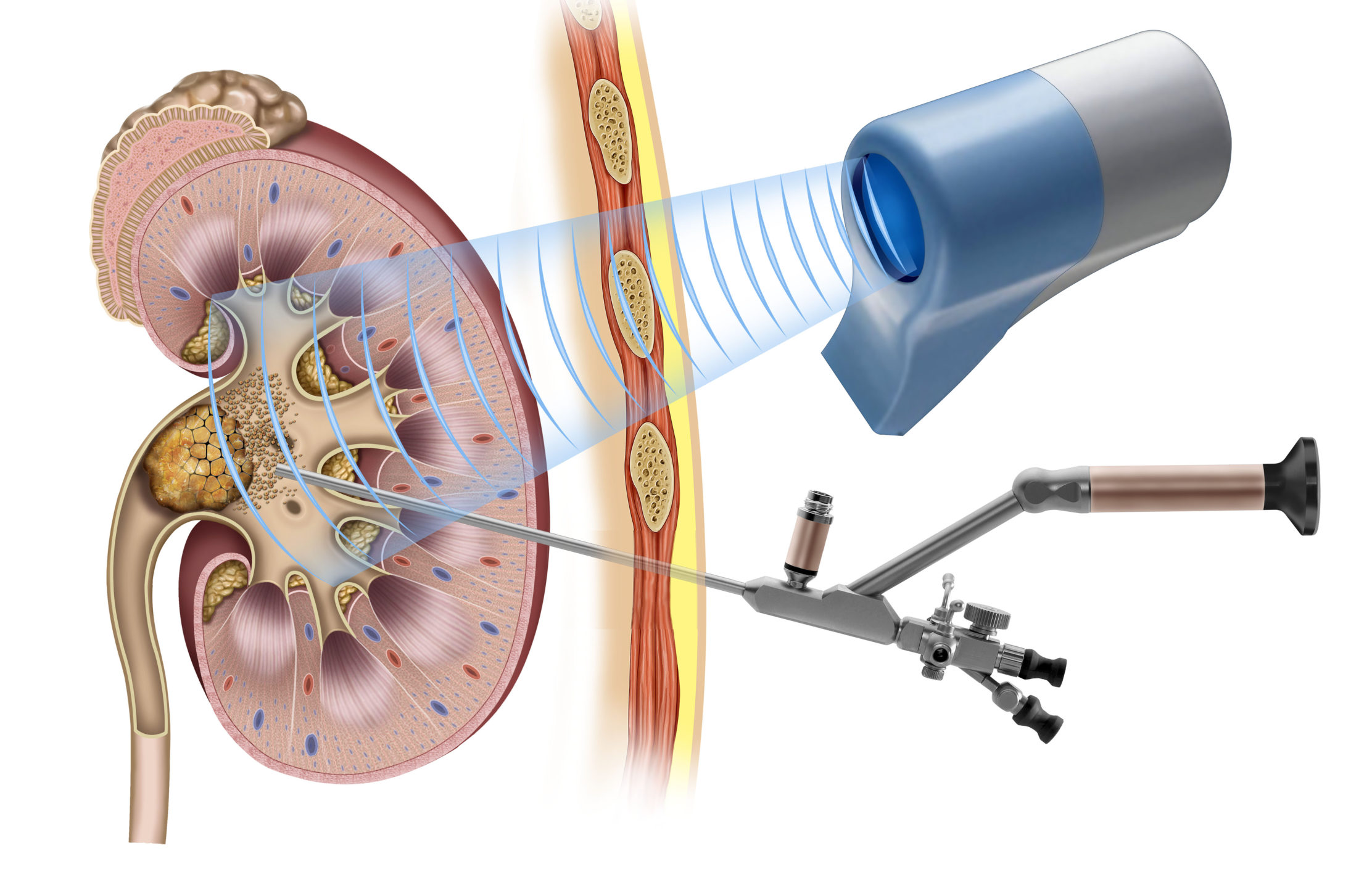Access your own patient portal, provided by NCSH.

Surgery
Extracorporeal Shockwave Therapy and Kidney Stones
Have you or a loved one experienced severe pain in your lower back, blood in your urine, nausea, vomiting, fever, chills, or urine that smells bad or looks cloudy? One or more of these symptoms may mean that you are suffering from kidney stones. What are kidney stones, are they dangerous, and how does something that sounds like it’s right out of Star Wars—extracorporeal shockwave therapy—help treat them? North Carolina Specialty Hospital urology specialists explain what you need to know and how to get rid of kidney stones.
Causes of Kidney Stones, the Best Way To Pass a Kidney Stone, and More

You may be surprised to find out that kidney stones are really stones—right inside your urinary tract. They’re made from minerals and salts in your urine that crystallize together into hard deposits.
Normally, these substances are flushed out of the urinary tract by urine before stones have a chance to form. But when there is an abundance of these stone-forming elements, it’s harder for the system to eliminate them to keep the crystallization from happening.
Reasons for the chemical imbalances that can cause kidney stones include:
- Not drinking enough water to create adequate urine
- Eating a diet with too much sugar or salt
- Having too much calcium in your system
- Obesity
- Taking supplements or medications that can add to a buildup of stone-forming substances
- Having gastric surgery or digestive diseases that affect the absorption of calcium and water
- This includes diseases such as Crohn’s disease or ulcerative colitis that cause diarrhea and make the body lose a lot of fluid
- Having other medical conditions such as diabetes, cystinuria, hyperparathyroidism, and repeated urinary tract infections
What happens at the urologist?
When you visit your urologist, they will take your medical history, examine you, and run diagnostic blood and urine tests. You may also be sent for imaging. If you have passed any stones, remember to bring them with you to help in the analysis and diagnosis.
There are four main types of kidney stones:
- Calcium stones. These are the most common stones, made when too much calcium in the urine combines with oxalate, a substance made by the liver.
- Struvite stones. These stones result from chronic urinary tract infections.
- Uric acid stones. These common stones form in people who lose too much fluid because of diarrhea, who suffer from diabetes, or who eat a diet high in animal protein and low in fruits and vegetables.
- Cystine stones. These rare stones form in people with a hereditary disorder called cystinuria, where the kidneys excrete too much of a specific amino acid.
Your treatment may depend on the size of the stone and your condition, although identification may not happen until one is passed.
How do you get rid of kidney stones? What are the treatments?
One interesting thing about kidney stones is that you probably don’t even know if you have any. It’s only when they start to move or enter the ureters (the tubes that connect the kidneys and bladder) that you will feel pain and experience other symptoms.
If you are suffering from small stones:
Your urologist will recommend drinking a lot of water to help flush them out, along with taking pain relievers and an alpha-blocker to relax ureter muscles, making it easier to pass the stones faster and with less pain. It may take up to several weeks to pass all of the stones.
Or, your urologist may insert a ureteroscope, a thin, lighted tube with a camera, into your urethra and bladder to your ureter to snare or break the stones into smaller pieces.
If you are suffering from stones too large to pass:
Your urologist may advise using extracorporeal shockwave therapy (or lithotripsy), which uses sound waves to break up the stones for easier passing. This non-invasive procedure takes about an hour. You may be under light anesthesia to stay comfortable.
If kidney stone shockwave therapy doesn’t work, your urologist may recommend percutaneous nephrolithotomy, a procedure where stones are removed through a small incision in your back. You will be under general anesthesia for this.
Will you get another kidney stone?
You may—but your urologist will recommend lifestyle changes that can help reduce the risk of developing kidney stones again. Not surprisingly, these include:
- Drinking enough water
- Eating more fruits and vegetables
- Reducing salt and sugar in your diet
- Losing weight
- Taking the recommended amount of calcium
In some instances, your provider may also prescribe medication if these steps aren’t enough. But there is some good news about kidney stones: While painful, they usually cause no permanent damage when they’re recognized and treated in time.
Worried you may have a kidney stone? Come to North Carolina Specialty Hospital.
Our urology department is a leader in the region, and our expert urologists will provide comfort, manage your pain, and get you back to good urinary health with the latest cutting-edge procedures.
To make an appointment today, just visit the physician page and click on a physician’s picture. We look forward to helping you soon.
Stay Current
Educational Articles & More
View News & Press